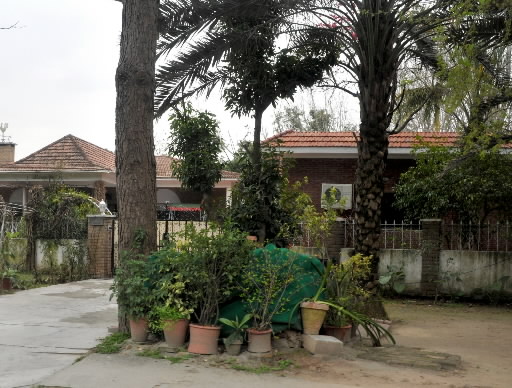Nuclear weapons can be eliminated: Chapter 2, Part 1
Apr. 8, 2009
Chapter 2: South Asia’s cold war
Part 1: Black market
by Junichiro Hayashi, Staff Writer
Sale of technology by father of nuclear program
On the strength of nuclear weapons, a volatile conflict between India and Pakistan resembling the Cold War between the East and West continues. More than 10 years have passed since the two nations defiantly conducted nuclear tests. The international community is concerned that Islamic extremists are active behind the scenes and that the region may be the source of nuclear terrorism. How should we deal with the global flashpoint of South Asia? The Chugoku Shimbun visited the area to find out.
A small camouflage-painted guardhouse stood in front of a house in an upscale gated residential area in Islamabad, the capital of Pakistan. As I pointed my camera out the window of our car, the eyes of a guard flashed. “Hurry! Hurry!” said my guide to our driver.
The owner of the mansion is Abdul Qadeer Khan, 72, whom many regard as a hero for his role as the father of Pakistan’s nuclear program. Although he was released from house arrest on February 6 of this year, security at his home remains tight.
Dr. Khan was the prime mover behind the development of the black market in nuclear materials and equipment in the 1970s. At the time Pakistan’s industrialization lagged so far behind the West it was said the country could not even manufacture a sewing needle. Initially, these things were imported secretly from the West. Dr. Khan is regarded as the man who helped Pakistan become the first Islamic nation to acquire nuclear weapons. In 2004 his admission that he had provided nuclear technology to Libya, Iran and North Korea shook the world.
Physicist Pervez Hoodbhoy, 58, has a photograph of a burned-out Hiroshima on the wall of his office at Quaid-e-Azam University located in the outskirts of Islamabad. He frowned and said, “The fact that Dr. Khan was released sent the wrong message to the world, suggesting that nuclear crimes could go unpunished.”
It is not only nations that want nuclear weapons. Northwest Pakistan along the border with Afghanistan is a breeding ground for terrorist organizations that engage in armed conflicts with the Pakistani government and Western nations. They are believed to have the support of some nuclear scientists.
In 2001 a nuclear scientist who was a former member of the Pakistan Atomic Energy Commission was arrested for suspected involvement with the Taliban, an Islamic fundamentalist group. The scientist had been photographed with Osama bin Laden, leader of the international terrorist group Al Qaeda.
According to Dr. Hoodbhoy, there are between 200 and 400 scientists in Pakistan who are knowledgeable about the manufacture of nuclear weapons, and Dr. Khan, a metallurgical engineer, is only one of them. “There is a great danger that South Asia will become the seat of nuclear proliferation for terrorist organizations,” Dr. Hoodbhoy said.
Last year in neighboring India there was a series of terrorist acts by Islamic extremists in major cities, such as New Delhi and Mumbai.
G.V.C. Naidu, 54, a professor at Jawaharlal Nehru University in New Delhi who specializes in foreign policy, said, “If terrorists have nuclear weapons they will use them. Unlike nations, there are no controls on them.”
The possession of nuclear weapons began 64 years ago with the U.S. Today nuclear weapons are increasingly likely to fall into the hands of terrorists. Both Professor Naidu and Dr. Hoodbhoy sounded a warning: the only way the world can free itself from the danger of nuclear weapons is to abolish them.
(Originally published on March 20, 2009)
To comment on this article, please click the link below. Comments will be moderated and posted in a timely fashion. Comments may also appear in the Chugoku Shimbun newspaper.








